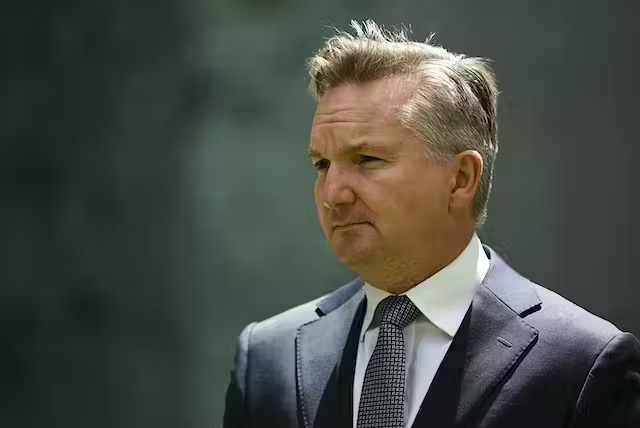Australia’s climate minister, Chris Bowen, says Pacific nations and other countries vulnerable to climate catastrophe should be the major beneficiaries of “loss and damage” funding, and a broader range of countries should bankroll the international effort along with the private sector.
Bowen used a speech to a foreign policy thinktank on Tuesday night to signal Australia’s position ahead of Cop28, the looming United Nations-led climate talks, which get under way in the United Arab Emirates later this month.
On the eve of the summit the UN has warned the world is on track for a “hellish” 3C of global heating. Given intensifying heatwaves, floods and droughts have taken lives and caused substantial economic damage around the world, the Cop27 summit in Egypt in November 2022 agreed to establish a “loss and damage” fund to help vulnerable countries rebuild social and physical infrastructure after extreme weather events exacerbated by greenhouse gas emissions.
But the details of the fund are not yet agreed.
Bowen told the Lowy Institute that Australia supported loss and damage funding – a concept that has been contentious for a number of decades. The government had already “contributed constructively to the design of the new fund and future funding arrangements” in the run-up to COP28.
He said Australia’s objective was to ensure the new arrangements “delivered practical outcomes and maximum impact for the Pacific, and other countries who are particularly vulnerable to climate impacts”.
Bowen said the new fund needed to be bankrolled by “a broad donor base, including private and innovative sources of finance” and he signalled more countries needed to step up to their international responsibilities, not just the industrialised nations that have been required, historically, to make the larger contributions to climate finance.
While he didn’t name particular countries, Bowen’s observation leaves open the idea that China, Russia and the Gulf states would make financial contributions to dealing with the impact of climate change-fuelled disasters – a position that will face resistance at the COP.
“It’s time to have that discussion,” Bowen said. “Arguing that climate finance should come from as broad a donor base as possible is about maximising the flow of funds to help the developing world deal with climate change which is ultimately in all our interest.”
International loss and damage financing has foundered in the past because of disagreement between wealthy and developing nations about who should pick up the tab.
Bowen noted the principle agreed back in 1992 recognising that countries had “common but differentiated responsibilities” when it came to pursuing emissions reduction and combatting environmental degradation was the correct approach at that time.
“But the world wasn’t set in stone in 1992,” Bowen said. “Just because a country wasn’t wealthy or was not a major emitter in 1992 doesn’t mean the same is the case 30 years later.
“Nor should the contributions of countries be set in stone either. Let me be even clearer, the world has changed a lot since 1992.”
The prime minister, Anthony Albanese, used the recent Pacific Islands Forum to unveil a new agreement with Tuvalu – a low lying Pacific nation. Australia will offer residency to people impacted by climate change through a new security treaty with the country.
Bowen noted on Tuesday night Australia had also rejoined the Green Climate Fund and intended to contribute to the new Pacific Resilience Facility – “a Pacific-built trust fund that will be established to invest in small-scale climate and disaster resilient projects”.
As well as the jostling over the detail about loss and damage funding, Australia’s climate minister said this year’s Cop would also include a global stocktake of progress. Bowen predicted this would be a “large, substantial and contested discussion” and Australia would be arguing for “stronger mitigation language”.
He noted the International Energy Agency’s World Energy Outlook had “found that for the first time, peaks in global demand for coal, oil and natural gas are all visible this decade, thanks to the combination of growing momentum behind clean energy technologies and structural economic shifts around the world has major implications for fossil fuels”.
Bowen said Australia would support a tripling of global renewables capacity and doubling of global energy efficiency efforts. In the run-up to Cop, the secretary general of the UN, António Guterres, has urged countries to commit to tripling renewable energy capacity by 2030 and to phasing out fossil fuels with a clear timeframe.
Bowen told the Lowy Institute that Australia would play “a reasonably unique role in this conversation” because like Canada, “another traditional fossil fuel-based economy in the middle of a major transition and arguing for progressive outcomes in international fora, we can play the role of a country that is dealing with the practical implications of the transition each and every day”.
While the Albanese government is under sustained domestic political pressure to stop approving new coal and gas projects, Bowen said the transition to net zero was “no theoretical exercise for us”.
“We come to the discussions not inhibited by our experience with fossil fuels but informed by it,” he said.
SOURCE: THE GUARDIAN/PACNEWS













